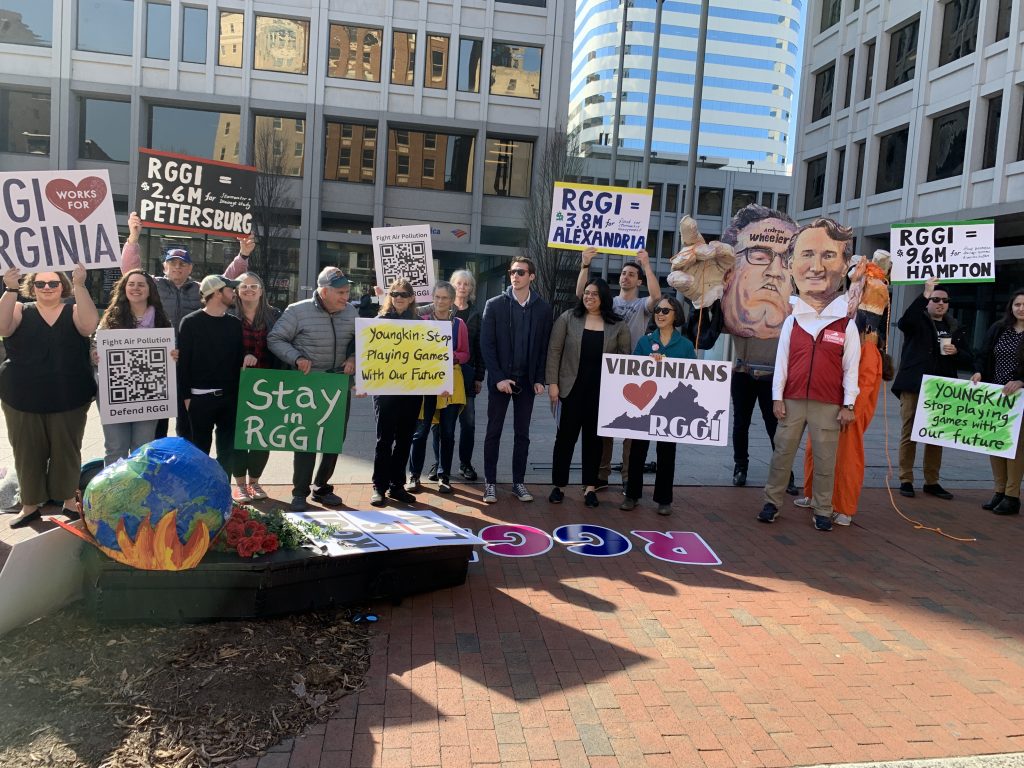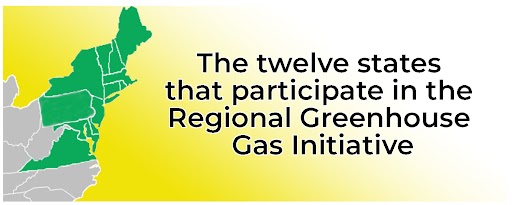
Protesters gather outside of the Virginia Department of Environmental Quality in downtown Richmond to urge Gov. Youngkin not to withdraw the state from RGGI. Photo by Jen Lawhorne
The Clean Energy & Community Flood Preparedness Act, established by the Virginia legislature in 2020, required the commonwealth to enter the regional carbon market, among other things.
Gov. Glenn Youngkin received a resounding call from the public to remain in the Regional Greenhouse Gas Initiative during the latest comment opportunity on his proposal to withdraw Virginia from the climate program. Nearly 88% of the more than 6,600 comments submitted to the Virginia Department of Environmental Quality opposed the governor’s proposal to ignore the state climate law that requires Virginia to participate in the cap-and-invest program known as RGGI. These pro-RGGI comments provided more evidence for the popularity of the program and built upon a sustained effort by the public to deliver that message to Youngkin.
This was only the latest in a public wave of support for RGGI that has grown in the two years since Youngkin announced his intention to withdraw Virginia from the program. In March of this year, more than 50 people spoke up for RGGI at a public hearing convened by DEQ — and no one spoke in favor of the RGGI repeal. During the 2023 and 2022 General Assembly sessions, the Virginia Senate roundly defeated legislative attempts to stop Virginia from participating in RGGI. In August 2022, Virginia residents marched, rallied and spoke up for RGGI outside DEQ headquarters and regional offices to demonstrate their opposition to the governor’s plan. In July, protestors marched backwards in downtown Richmond to demonstrate the governor’s retreat from climate progress. And ever since the administration announced its plan to withdraw Virginia from RGGI, supporters of climate action in Virginia have submitted dozens of letters to local, state and national papers decrying Youngkin’s unlawful pursuit.
Background on the RGGI program
TL;DR: RGGI empowers Virginia to limit carbon pollution from power plants at the lowest possible cost while funneling millions of dollars into at-risk communities.
The Regional Greenhouse Gas Initiative works by placing a cap on how much carbon pollution power plants in participating states are permitted to produce. These power plants must purchase credits to account for that pollution via quarterly carbon auctions, and the revenue from those auctions is then funneled to member states to fund an array of climate and clean energy programs. In Virginia, proceeds from the RGGI auctions are reinvested in communities impacted by flooding due to climate change; into the development of affordable, energy efficient housing for low-income Virginians; and into weatherization programs that lower household energy burdens and improve living conditions. RGGI is expected to deliver a positive economic impact to Virginia of more than $2 billion by 2030 and to create more than 2,000 new jobs in the process.
Over $452 million has been raised since Virginia joined RGGI in 2020, and dozens of localities across the commonwealth are already using their share of the funding to implement or develop climate resiliency plans. The Virginia Department of Housing and Community Development is using its share to implement innovative energy efficiency programs created from RGGI funding. From a climate perspective, RGGI has contributed to a 16.8% overall decrease in power plant emissions in Virginia as compared to 2020 pre-RGGI levels, reversing the previous decade’s fairly constant carbon emissions.

Twelve eastern states currently participate in RGGI. Since the program was established in 2009, emissions in the region have fallen by more than 50%
Background on the proposed repeal
TL;DR: This proposed repeal is unlawful, as Virginia’s participation in RGGI was required by law in 2020. Attempts to repeal this law were defeated in the subsequent 2022 and 2023 legislative sessions. The administration cannot simply initiate a regulatory repeal when it disagrees with state laws.
The State Air Pollution Control Board is a citizen board housed within the Virginia Department of Environmental Quality, consisting of seven members of the public appointed by the governor to adopt environmental regulations.
Virginia’s participation in RGGI is required by law, yet Youngkin has nonetheless directed Virginia’s State Air Pollution Control Board to repeal the regulation that implements the law, despite the fact that such an action is considered by legal experts to be outside the air board’s authority.
Under Youngkin’s direction, DEQ issued a Notice of Intended Regulatory Action in August of 2022 and opened a 30-day public comment period in September. Almost 850 comments were submitted by members of the public, and the comments overwhelmingly opposed the governor’s plan, expressing support for continued participation in the regional carbon market. Even so, in December of 2022 the Air Board voted 4-1 to repeal the regulation per the governor’s wish. Two board members abstained, agreeing with the premise that the board didn’t have the legal authority to take such an action.
In January of this year, the air board announced another public comment period, this time on the draft repeal regulation itself. The comment period was open for 60 days and closed on March 31. Additionally, the board held a public hearing on the repeal in mid-March. Now, Virginians are waiting for the board to review the written and oral comments collected by DEQ, which received a total of 6,607 written comments, including duplicates and 51 comments that were either indiscernible or unrelated. Out of the rest, 5,754 commenters were opposed to the repeal and supportive of staying in RGGI.
What’s next
The air board will meet soon to vote on the repeal, at which time Virginians will have one final chance to comment publicly on the board’s decision. This meeting and vote are expected to happen this summer, as Youngkin has stated publicly that he hopes the repeal process will wrap up by the end of 2023.
By moving forward with this misguided attempt to remove Virginia from RGGI, Youngkin has chosen to not only ignore the tremendous benefits that RGGI brings to Virginia communities, but to ignore the law and the voices of the people as well.
Help us continue to speak out against this repeal by calling Gov. Youngkin today!



Tour article is factually not true. How does 10 people say the majority want something. Should keep your opinions to your self stick with the truth.
I love RGGI
I agree with governor youngkin and stand with his decision.
Hi, Please tell Youngkin to leave his hands off of RGGI and Do Not Repeal it!! I am a Registered Virginian Voter and would appreciate it if my comment could be added to the list. Sorry but my Husband is a Disabled American Veteran and has been very sick and I missed the deadline. Thank you for this Wonderful Article!
As a “Virignian” or maybe a Virginian, please stop the the greenhouse gas stupidity. Even the name, greenhouse gas. Greenhouses are perfect places to grow more food, why wouldn’t we want a worldwide greenhouse? Thank you Governor for standing up for common sense capitalism.
Loudon County DOES NOT collect recycling nor do they even have a recycling facility! Hypocrites live there, the wealthiest County in the country.
The governor is taking powers which conflict with the law. He is ignoring the will of the people who elected him ! I find governor Youngkin more interested in running for President then listening to the people of Virginia!
It makes no sense whatsoever to remove Virginia from RGGI. We must do what we can to limit carbon emissions. The time is now before it is too late. This is an important and necessary program for Virginia’s well being. I see no good argument against it. It has already had a positive impact. What could anyone who cares about Virginia, Virginians, and our environment possibly have against this program? I do care and want this push to leave RGGI to be stopped.
I agree with Gov youngkin’s decision to withdraw.
As a senior the constant increases to my electrical bill is unsustainable on a fixed income. If the appeal to RGGI will reduce my electric bill, then please appeal it. If RGGI regulations will lower my electric, then please keep it. All I know is these green climate changes are very detrimental to seniors in terms of cost vs. benefits.
Nobody really believes in regional air quality efforts. Its either global or you are wasting time. Air doesn’t sit in one place. You are a weather denyer
STAY WITH RGGI! Virginia needs to be in a leadership position in LOOKING FORWARD toward alternative energy sources rather than desperately clinging to current energy technologies that we absolutely know will lead to tragic consequences for future generations.
Thanks for the comments and for reading my blog. We all have a responsibility to protect our environment, including by limiting carbon pollution to reduce our impact on the climate. Unfortunately, electric bills have been increasing in Virginia in part because our utilities are too reliant on fossil fuels. Among other factors, supply chain challenges from the pandemic and the war in Ukraine contributed to astronomical increases in the price of methane gas, costs which utilities pass directly onto us, their customers. Ultimately, transitioning to cleaner energy resources — combined with reforms to our monopoly utility system — will ensure more affordable and less-volatile energy costs for all of us.